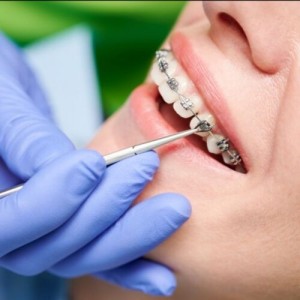
Risk assessment and caries management, in pediatric patients, using a smartphone application
Lara Figini
Recently there has been an increasing interest in mobile healthcare. The World Health Organization (WHO) has introduced the concept of m-health or mobile health, defined as medical and public health supported by mobile devices such as mobile phones, patient monitoring devices, personal digital assistances and information and communication technologies.
The mobile application-based health management system aims to improve the overall quality of medical services by increasing the productivity of the latter and reducing management costs.
There are multiple mobile applications available, including, in the field of oral hygiene, the application called "Brush DJ," a program developed to motivate the management of oral health. Another example of a mobile application is the "White Teeth" developed for patients who wear orthodontic appliances with the aim of preventing dental caries, helping to improve home oral hygiene habits.
"CAMBRA-kids," a mobile application to help assess the risk of caries in children and manage it accordingly, was first developed in Korea. It is an application that derives from CAMBRA —application for the management of caries based on risk assessment — and it has shown meaningful results in terms of usability, quality and usefulness.
CAMBRA assesses individual caries risk with a range of disease indicators, risk factors and protective factors. Accordingly, it classifies a patient's level of risk as low, moderate, high, and extremely high. The level of caries risk can be used to determine the need for therapeutic intervention. The application classifies children into two age groups: under five years and over six years.
Dental hygienists and dentists play an important role in facilitating the CAMBRA program throughout the clinical practice process. During the management process, these experts provide medical history taking, risk assessment through patient interviews, clinical evaluation with X-rays and photographs, saliva tests and bacterial tests, the application of fluoride or dental sealant. They also educate the patient and parents in correct and regular home oral hygiene.
Materials and methods
In a study published in the International Journal of Dental Hygiene in December 2021, the authors determined the effects on the management of dental caries using CAMBRA-kids in children under five over a period of one year.
Researchers conducted the study with 119 preschool children and their parents. The parents downloaded the CAMBRA-kids mobile application and entered specific and personalized risk and protection factors for their children. The dentist entered the indicators of disease after the clinical examination on the children. Based on the inputs, the caries risk group was automatically determined by the CAMBRA-kids application. Depending on the level of risk, caries management was conducted for 12 months according to guidelines.
Results
The level of caries risk in the children changed after conducting caries management for one year. In the variation of Caries Risk Assessment by factor, risk factors decreased in all risk groups, while protective factors increased in all risk groups.
Disease markers increased after 12 months in the extremely high-risk group and the high-risk group, but decreased in the low-risk group.
Conclusions
From the data of this study, it can be concluded that the use of the mobile application CAMBRA-kids on pre-school children has positive effects for caries management especially for subjects with high and an elevated risk of caries.
For more information: "Effect of dental caries management using ‘CAMBRA-kids’ mobile application for children under 5 years old."
 Related articles
Related articles
Dental decay is the most common chronic disease of children and it disproportionately affects those living in poverty, but the reasons for this are not clear. Passive smoking may be a modifiable risk...
Oral Hygiene & Prevention 20 August 2025
Personal oral hygiene and dental caries: A systematic review of randomised controlled trials
To conduct a systematic review of randomised trials assessing the association between personal oral hygiene and dental caries in the absence of the confounding effects of fluoride.
Pediatric dentistry 08 April 2025
Oral rehabilitation in pediatric dentistry: a clinical case report
Despite the emphasis and effort devoted to preventive dentistry, massive coronal destruction caused by dental caries or trauma is still seen in pediatric dentistry practice today.
Oral Hygiene & Prevention 15 January 2025
The aim of this study was to assess the influence of dietary and hygiene habits on the prevalence and intensity of dental caries.
Those who have had surgical obesity treatment have a higher risk of dental caries than before surgery. They also often experience a general decline in oral health. This has been shown by a thesis...
 Read more
Read more
Oral Hygiene & Prevention 05 January 2026
To assess effectiveness of an oral health education (OHE) programme on oral hygiene knowledge, practices, plaque control and gingival health of 13- to 15-year-old school children in Bangalore city.
Editorials 05 January 2026
Products 05 January 2026
Heartland Dental, the nation’s leading dental support organization, today announced that it has selected Dentira as the enterprise lab management platform for supported practices.
News 05 January 2026
Dentistry.One, a virtual-first dental care solution headquartered in Metuchen, NJ, announced it has been named the NJBIZ 2025 For-Profit Business of the Year (1–49 employees).
News 05 January 2026
Health-E Commerce, parent brand to FSA Store and HSA Store, the first and leading online stores dedicated to selling only FSA- and HSA-eligible products and services, recently announced a telehealth...














